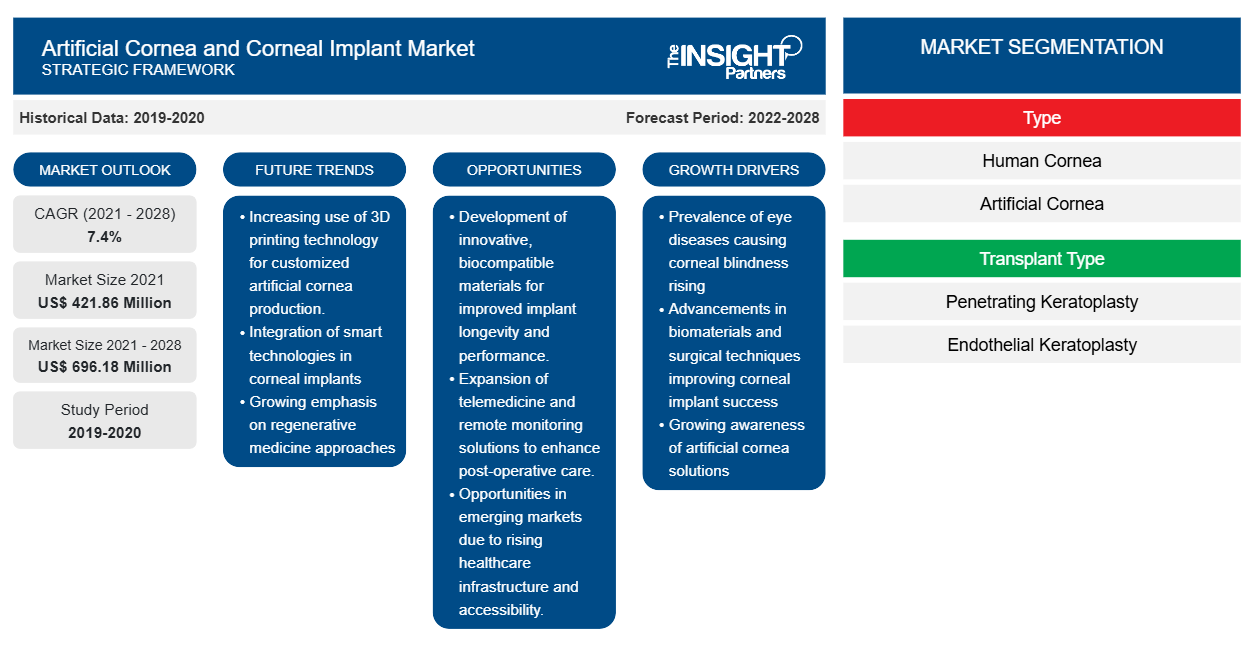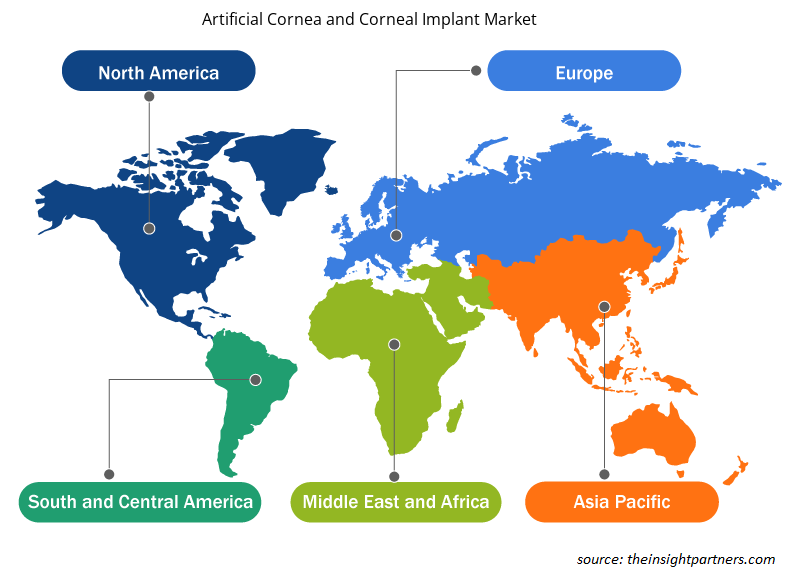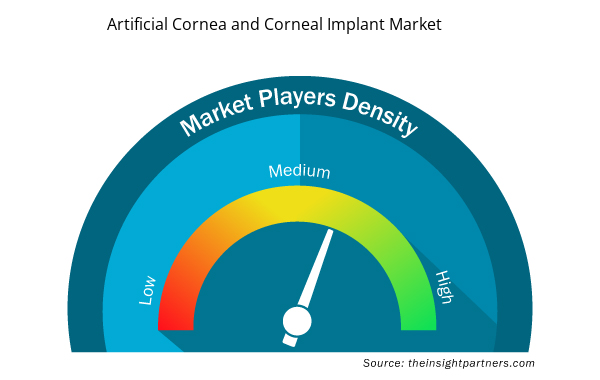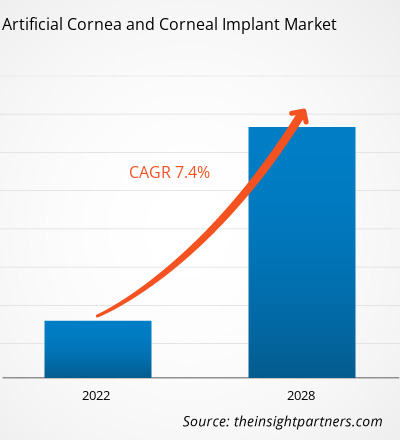The artificial cornea and corneal implant market to reach US$ 696.18 million by 2028 from US$ 421.86 million in 2021; it is expected to grow at a CAGR of 7.4% during 2021–2028.
An artificial cornea implantation surgery is performed to remove all or a part of the damaged cornea, followed by replacing it with healthy donor tissue. Currently, there is a shortage of cornea donors worldwide, and eye and tissue banking processes are in initial stages in many countries. Meanwhile, there is always a possibility that the human eye would reject the transplant, which can cause an infection to eye or the lack of vision. Cornea Implant is usually performed to treat conditions such as keratoconus and certain degenerative diseases. The artificial cornea tissue is made from polymer plastic such as silica material. Artificial cornea implant is of two types synthetic cornea implant and biosynthetic cornea implant.
The Artificial Cornea and Corneal Implant market growth is mainly attributed to factors such as the increasing prevalence of eye diseases causing corneal blindness and significant rise in elderly population. However, the high cost of ophthalmology surgeries and devices is hindering the market growth.
Customize This Report To Suit Your Requirement
You will get customization on any report - free of charge - including parts of this report, or country-level analysis, Excel Data pack, as well as avail great offers and discounts for start-ups & universities
Artificial Cornea and Corneal Implant Market: Strategic Insights

- Get Top Key Market Trends of this report.This FREE sample will include data analysis, ranging from market trends to estimates and forecasts.
You will get customization on any report - free of charge - including parts of this report, or country-level analysis, Excel Data pack, as well as avail great offers and discounts for start-ups & universities
Artificial Cornea and Corneal Implant Market: Strategic Insights

- Get Top Key Market Trends of this report.This FREE sample will include data analysis, ranging from market trends to estimates and forecasts.
Market Insights
3D Printed Artificial Corneas to Come up as Significant Future Trend in Artificial Cornea and Corneal Implant Market
3D printed artificial corneas made from stem cells and acellular corneal stroma have a potential to replace donated cornea in eye surgery. A team of researchers from the Pohang University of Science and Technology, and the Kyungpook National University School of Medicine in South Korea collaborated to 3D print artificial corneas using tissue-based bio-inks; the research has been published in "Biofabrication." Since the 3D printed corneas are made from corneal tissue materials, they are biocompatible, and the corneal microenvironment is reproduced through 3D cell printing technology to make them transparent, like human cornea. The 3D printed artificial corneas also help overcome the complications related to synthetic cornea implant in patients with cataracts and other ocular complications.
Researchers at Newcastle University have also developed a 3D printed artificial cornea for the first time. After examining the eyes of a volunteer, they collected enough data to create a 3D model of the cornea. organization engineer explained that one of the most difficult aspects of this projects is using the right materials to maintain the concave shape and finding ink that that is thin enough to spray through the nozzles of the 3D printer. With just one healthy human cornea, they can 3D print 50 artificial corneas, which is a breakthrough in ophthalmology. Furthermore, one of the key advantages of 3D printing is that collagen can be deposited in layers, which allows for the simulation of the composition of collagen fibers in the natural corneal matrix. Thus, upon their successful commercialization for clinical usage, the 3D printed biocorneas are likely to emerge as a significant trend in the artificial cornea and corneal implant market.
Type-Based Insights
The artificial cornea and corneal implant market, by type, is segmented into human cornea and artificial cornea. The human cornea segment is likely to hold a larger share of the market in 2021; however, the artificial cornea segment is expected to register a higher CAGR of 7.9% during the forecast period.
Transplant Type-Based Insights
By transplant type, the artificial cornea and corneal implant market is segmented into penetrating keratoplasty, endothelial keratoplasty, and others. The penetrating keratoplasty segment is likely to hold the largest share of the market in 2021; however, the endothelial keratoplasty segment is expected to register the highest CAGR during 2021–2028.
Disease Indication-Based Insights
The artificial cornea and corneal implant market, by disease indication, is segmented into Fuchs’ Dystrophy, keratoconus, fungal keratitis, and others. The Fuchs’ Dystrophy segment is likely to hold the largest share of the market in 2021; however, the fungal keratitis segment is anticipated to register the highest CAGR of 7.8% during the forecast period.
End User-Based Insights
The artificial cornea and corneal implant market, by end user, is segmented into hospitals, specialty clinics and ASCs, and others. The specialty clinics and ASCs segment would hold the largest share of the market in 2021, and it is anticipated to register the highest CAGR of 7.8% in the market during the forecast period.
Product launches and approvals are commonly adopted strategies by companies to expand their global footprints and product portfolios. Moreover, the laboratory developed test market players focus on the partnership strategy to enlarge their clientele, which, in turn, permits them to maintain their brand name globally.
The report segments artificial cornea and corneal implant market as follows
Based on type, artificial cornea and corneal implant market is segmented into human cornea, and artificial cornea. Based on transplant type, the artificial cornea and corneal implant is segmented into penetrating keratoplasty, endothelial keratoplasty, others. Based on disease indication, the artificial cornea and corneal implant is segmented Fuchs’ Dystrophy, keratoconus, fungal keratitis, others. Based on end user, the artificial cornea and corneal implant is segmented into hospitals, specialty clinics and ASCs, others. On the basis of geography, the artificial cornea and corneal implant market is segmented into North America (the US, Canada, and Mexico), Europe (the UK, Germany, France, Italy, Spain, and Rest of Europe), Asia Pacific (China, Japan, India, Australia, South Korea, and Rest of Asia Pacific), the Middle East and Africa (the UAE, Saudi Arabia, South Africa, and Rest of the Middle East and Africa), and South and Central America (Brazil, Argentina, and the Rest of South and Central America).
Artificial Cornea and Corneal Implant Market Regional Insights
The regional trends and factors influencing the Artificial Cornea and Corneal Implant Market throughout the forecast period have been thoroughly explained by the analysts at Insight Partners. This section also discusses Artificial Cornea and Corneal Implant Market segments and geography across North America, Europe, Asia Pacific, Middle East and Africa, and South and Central America.

- Get the Regional Specific Data for Artificial Cornea and Corneal Implant Market
Artificial Cornea and Corneal Implant Market Report Scope
| Report Attribute | Details |
|---|---|
| Market size in 2021 | US$ 421.86 Million |
| Market Size by 2028 | US$ 696.18 Million |
| Global CAGR (2021 - 2028) | 7.4% |
| Historical Data | 2019-2020 |
| Forecast period | 2022-2028 |
| Segments Covered |
By Type
|
| Regions and Countries Covered | North America
|
| Market leaders and key company profiles |
Artificial Cornea and Corneal Implant Market Players Density: Understanding Its Impact on Business Dynamics
The Artificial Cornea and Corneal Implant Market is growing rapidly, driven by increasing end-user demand due to factors such as evolving consumer preferences, technological advancements, and greater awareness of the product's benefits. As demand rises, businesses are expanding their offerings, innovating to meet consumer needs, and capitalizing on emerging trends, which further fuels market growth.
Market players density refers to the distribution of firms or companies operating within a particular market or industry. It indicates how many competitors (market players) are present in a given market space relative to its size or total market value.
Major Companies operating in the Artificial Cornea and Corneal Implant Market are:
- AJL OPHTHALMIC S.
- ADVANCING SIGHT NETWORK
- Aurolab
- CORNEA BIOSCIENCES INC.
- LinkoCare Life Sciences AB
Disclaimer: The companies listed above are not ranked in any particular order.

- Get the Artificial Cornea and Corneal Implant Market top key players overview
Company Profiles
- AJL OPHTHALMIC S.
- ADVANCING SIGHT NETWORK
- Aurolab
- CORNEA BIOSCIENCES INC.
- LinkoCare Life Sciences AB
- KERAMED, INC.
- EyeYon Medical
- Florida Lions Eye Bank
- Corneat Vision
- CorneaGen
- Historical Analysis (2 Years), Base Year, Forecast (7 Years) with CAGR
- PEST and SWOT Analysis
- Market Size Value / Volume - Global, Regional, Country
- Industry and Competitive Landscape
- Excel Dataset



Report Coverage
Revenue forecast, Company Analysis, Industry landscape, Growth factors, and Trends

Segment Covered
Type, Transplant Type, Disease Indication, End User

Regional Scope
North America, Europe, Asia Pacific, Middle East & Africa, South & Central America

Country Scope
Africa, Argentina, Australia, Brazil, Canada, China, France, Germany, India, Italy, Japan, Mexico, Saudi Arabia, South Korea, Southeast Asia, Spain, United Arab Emirates, United Kingdom, United States
Frequently Asked Questions
Which type is expected to dominate the market in the forecast period?
The artificial cornea and corneal implant is led by type artificial cornea segment is growing significantly due to the increasing attention to the development of artificial corneal implants. The growing research in cornea is playing a vital role in developing artificial cornea and corneal implant. For instance researchers at Newcastle University have also developed a 3D printed artificial cornea for the first time. After examining the eyes of a volunteer, they collected enough data to create a 3D model of the cornea
What are future trends of artificial cornea and corneal implant market?
Researchers at Newcastle University have also developed a 3D printed artificial cornea for the first time. After examining the eyes of a volunteer, they collected enough data to create a 3D model of the cornea. Organization engineer explained that one of the most difficult aspects of this projects is using the right materials to maintain the concave shape and finding ink that that is thin enough to spray through the nozzles of the 3D printer. With just one healthy human cornea, they can 3D print 50 artificial corneas, which is a breakthrough in ophthalmology. Furthermore, one of the key advantages of 3D printing is that collagen can be deposited in layers, which allows for the simulation of the composition of collagen fibers in the natural corneal matrix. Thus, upon their successful commercialization for clinical usage, the 3D printed biocorneas are likely to emerge as a significant trend in the artificial cornea and corneal implant market
What is the regional analysis in terms of artificial cornea and corneal implant market?
The growth of the region is attributed to factors such as rising public–private partnerships, and increasing funding activities are widely enhancing the performance of medical devices. Moreover, presence of well-developed healthcare infrastructure and government support are some of the prominent factors propelling the market growth in Asia Pacific. In Asia Pacific, India is the largest market for artificial cornea and corneal implant. The market growth in Asia Pacific is mainly attributed to factors such as the growing geriatric population, increasing incidents of eye diseases, large number of product launches. However concerns high cost of ophthalmology surgeries and devices s hinders the market growth in Asia Pacific.
What are the driving factors for the artificial cornea and corneal implant market across the globe?
The growth of the artificial cornea and corneal implant market is mainly attributed to factors such as the increasing prevalence of eye diseases causing corneal blindness and significant rise in elderly population. However, the high cost of ophthalmology surgeries and devices is hindering the market growth. In February 2021, EyeYon Medical, an Israeli start-up involved in developing ophthalmic products for vision-threatening conditions, announced that it has received CE Mark for its EndoArt, after conducting clinical trials demonstrating its safety and efficacy in the treatment of chronic corneal edema which is contributing to the growth of the target market. Such strategic steps are also projected to drive the market growth.
What is artificial cornea and corneal implant mean?
An artificial cornea implantation surgery is performed to remove all or a part of the damaged cornea, followed by replacing it with healthy donor tissue. Currently, there is a shortage of cornea donors worldwide, and eye and tissue banking processes are in initial stages in many countries. Meanwhile, there is always a possibility that the human eye would reject the transplant, which can cause an infection to eye or the lack of vision. Cornea Implant is usually performed to treat conditions such as keratoconus and certain degenerative diseases. The artificial cornea tissue is made from polymer plastic such as silica material. Artificial cornea implant is of two types—synthetic cornea implant and biosynthetic cornea implant.
Trends and growth analysis reports related to Life Sciences : READ MORE..
The List of Companies - Artificial Cornea and Corneal Implant Market
- AJL OPHTHALMIC S.
- ADVANCING SIGHT NETWORK
- Aurolab
- CORNEA BIOSCIENCES INC.
- LinkoCare Life Sciences AB
- KERAMED, INC.
- EyeYon Medical
- Florida Lions Eye Bank
- Corneat Vision
- CorneaGen

 Get Free Sample For
Get Free Sample For